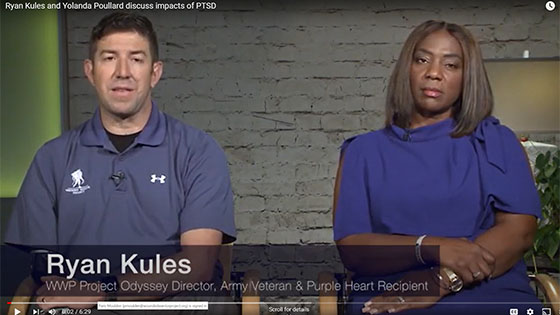During PTSD Awareness Month, Wounded Warrior Project Reminds Veterans Mental Health Support is Available
JACKSONVILLE, Fla. (June 10, 2022) – Barriers to care delay treatment for veterans dealing with post-traumatic stress disorder (PTSD). For wounded veterans, stigma can be one of the biggest barriers they face.
According to the Annual Warrior Survey conducted by Wounded Warrior Project® (WWP), nearly 1 in 5 warriors reported difficulty or delays getting or continuing professional care for their mental health. Of those warriors, 2 in 3 say they would feel embarrassed or ashamed to seek care.
“Breaking through that stigma is vital to helping veterans heal,” said Ryan Kules, Army veteran and WWP Project Odyssey director. “Wounded Warrior Project tries to break through stigma by bringing veterans together and showing them they are not alone.”
Ryan knows about overcoming the wounds of war – he survived an improvised explosive device detonating near him while serving in Iraq. Ryan was in a coma for two weeks.
Read how Wounded Warrior Project helps veterans combat stigma and take on PTSD.
A RAND study estimates around 600,000 post-9/11 veterans live with the symptoms of PTSD. Symptoms include irritability, being constantly on alert, sleeplessness, nightmares, and avoidance. PTSD can negatively impact someone’s life and put pressure on relationships. WWP’s free programs and services meet a veteran where they are in their recovery to address PTSD.
“Wounded Warrior Project’s programs save lives,” Ryan said. “It starts with realizing that getting help is courageous.”
“The moment I decided to get help – I received a phone call from an old first sergeant, and she suggested I go to Warrior Care Network.” said wounded warrior Yolanda Poullard.
Wounded Warrior Project launched Warrior Care Network® six years ago to provide clinical treatment for PTSD. Warrior Care Network’s four partner academic medical centers deliver a year’s worth of clinical care in 2-to 3- week intensive outpatient programs. Warriors and families do not pay for this treatment.
“You will survive PTSD if you give Warrior Care Network a chance,” Yolanda said.
Beyond Warrior Care Network, WWP provides non-clinical support for mental health as well. WWP Talk is a telephone support line that helps veterans and family members. Project Odyssey is an adventure-based program that teaches warriors new coping skills to overcome PTSD symptoms. The program brings veterans together to restore the camaraderie they lost when they left the military. All support is provided to veterans and families free of charge.
Contact: Rob Louis — Public Relations, rlouis@woundedwarriorproject.org, 904.627.0432
About Wounded Warrior Project
Since 2003, Wounded Warrior Project® (WWP) has been meeting the growing needs of warriors, their families, and caregivers — helping them achieve their highest ambition. Learn more.
